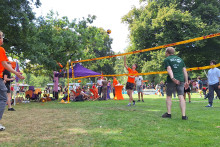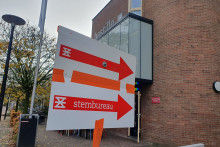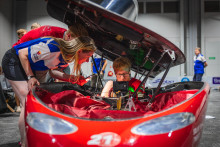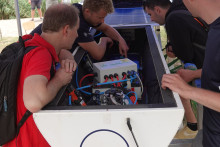Andreea Merticaru: romanian physicist among dutch engineers
'I learned to be insistent and annoying'
'As a graduate of physics I hated by nature all the capricious machines wired to their vital heart, the plug. Therefore the start of my PhD in Electrical Engineering at the end of 1998 was not easy.
In my country I worked for a short time in a research institute in Bucharest but that experience did not help me at all. The way of working was different. In IMT, if I wanted to do something that was not my field, I went to an expert explaining to him what I planned and he did the job. In this way the IMT's projects looked like a puzzle, each piece in its place but in such a way that only at the end you had a complete picture. Of course there were some mismatches and errors. Before coming here I did not see anything wrong in that. It was simply how things worked.
Here I had to do everything by myself, without many explanations. I faced a big problem; I knew the machines and the devices by name and, theoretically, what they were doing but nothing more.
Besides, engineers do not have the same way of thinking as physicists, mathematicians or chemists. I think that people who have a fundamental science study as background have a different way of approaching problems than people dealing with engineering. If I start an experiment and it is not working I put everything in differential equations, I do modelling, read literature, anything but I do not start the experiment again until I am convinced I understand the basics behind it.
For me, a good start is when I have cleared the field, I have a few steps and precise tasks to carry out and I know where I have to look for answers. Otherwise I do not take a step ahead. The engineers tend to do experiments as much as they can without stressing so much on details. But at the end of a run of 50% successful tests they produced a statistic and they conclude about the wrong step so the next run will be 70% successful and the loop repeats until they have a very high rate of successful experiments. After that comes the model.
So although I had a project I did not know where to start, whom to ask specific questions, which device was good for what, when I could use that thing or that one and who was the person to introduce me to the machines in the Clean Room.
Fortunately for my work I met some patient and helpful people. I learned to ask as many people I can if I want something, to put questions if something is not clear, to be insistent and annoying if I like to clarify something. I have learned that I have to push if I want to get through.
By this time something in my mind changed, I do not know exactly how or when. I noticed that I was able to do more, starting from the tons of bills in the mailbox at home to stubborn transistors. It was a struggle with myself.'







